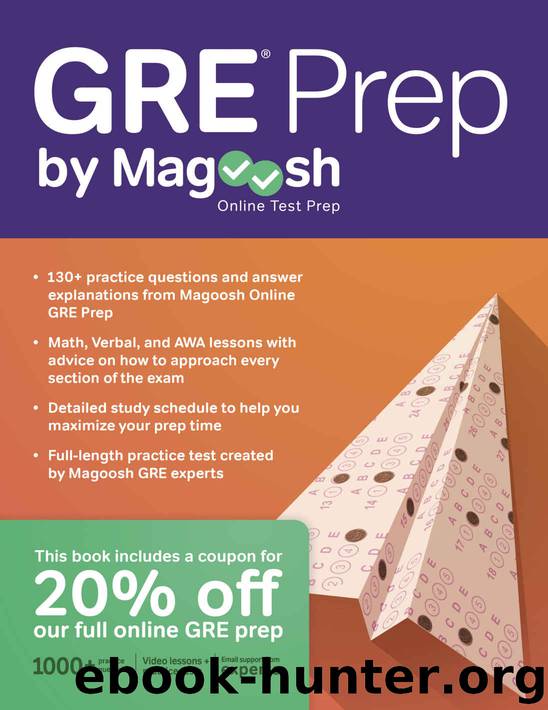GRE Prep by Magoosh by Magoosh & Chris Lele & Mike McGarry

Author:Magoosh & Chris Lele & Mike McGarry [Lele, Chris]
Language: eng
Format: epub
Publisher: RTC Publishing
Published: 2017-01-29T00:00:00+00:00
Question 23
Difficulty: Very Hard · Percent Correct: 25%
Answers:
The “timeworn yarn” implies that tradition, in this instance, is incorrect. Therefore, the first blank is (A) buck, which means “to go against.” For the second blank, we find the clue deeper in the sentence (“constantly conducting experiments”). Therefore, the idea that babies are (D) passively receiving has been turned on its head, or shown not to be true.
For the final blank, we have a simple shift. The “although” implies that while they are novice scientists, so to speak, they’re (G) far from “exhibiting mastery.”
What does “what tradition has long known, science must labor through its usual rigorous protocols . . .” mean? And how does buck fit in the first blank? “What tradition has long known, science must labor through its usual rigorous protocols to arrive at, albeit the very same assessment.”
In other words, people already know things, but science has to work very hard to prove them true.
“Concerning learning in infants, recent findings (i) this trend . . .”
Now you’re looking at a specific case. People know things about infants, and science works very hard to evaluate what people know. You don’t know whether the scientist’s results support the “trend” in this sentence or undermine it. You have to read on to find out.
“The timeworn yarn that babies are (ii) —and oftentimes disregarding—stimuli from their surroundings has been turned on its head . . .”
Now, you know the “timeworn yarn” has been “turned on its head.” This is your clue for the first blank, and a clear shift from the very first sentence. In this case, science isn’t proving common knowledge. It’s actually going against common knowledge. Thus, recent findings buck the trend.
Why is the answer to the third blank far from?
“although (iii) exhibiting a mastery of their respective worlds, infants are constantly conducting experiments—very much like scientists themselves—testing their limits vis-a-vis an environment at once enchanting and frustrating.”
Here, infants are compared to scientists—both test their limits. This makes sense given our answers to the first and second blanks: recent findings “buck” the trend that infants “passively receive” stimuli.
However, the part “although (iii) exhibiting a mastery of their respective worlds” sets a limit on infants and scientists. Both infants and scientists test their limits and explore their environments, but neither are masters of their respective worlds.
The author is acknowledging that there’s a limit before introducing the main idea. Let’s look at an example:
“Although far from having the talent to be a professional, Bob is a good chess player.”
Before the writer says, “Bob is a good chess player,” she introduces a limit on that statement.
That’s what happening in this sentence. The “although” tells the reader to want a contrast of some kind with “constantly conducting experiments and testing limits.” Infants do this, but that doesn’t mean they exhibit mastery of their world. The author wants to acknowledge the limit of his statement. “Potentially exhibiting mastery” nor “known for exhibiting mastery” would contrast properly with “constantly conducting experiments and testing limits.”
Download
This site does not store any files on its server. We only index and link to content provided by other sites. Please contact the content providers to delete copyright contents if any and email us, we'll remove relevant links or contents immediately.
Cracking the GRE Premium Edition with 6 Practice Tests, 2015 (Graduate School Test Preparation) by Princeton Review(4294)
Kaplan MCAT Organic Chemistry Review: Created for MCAT 2015 (Kaplan Test Prep) by Kaplan(4014)
Kaplan MCAT Behavioral Sciences Review: Created for MCAT 2015 (Kaplan Test Prep) by Kaplan(2987)
MCAT Psychology and Sociology Review: New for MCAT 2015 by Princeton Review(2869)
The Official Guide for GMAT Review 2015 with Online Question Bank and Exclusive Video by Graduate Management Admission Council (GMAC)(2808)
Programming in C (4th Edition) (Developer's Library) by Stephen G. Kochan(2163)
Cracking the LSAT, 2012 Edition by Princeton Review(1956)
GMAT Official Guide 2018 Verbal Review by GMAC (Graduate Management Admission Council)(1870)
The PowerScore LSAT Logical Reasoning Bible by David M. Killoran(1865)
GRE Premier 2017 with 6 Practice Tests by Kaplan(1863)
MCAT Physics and Math Review 2019-2020 by Kaplan Test Prep(1812)
Peterson's Master the GRE 2014 by Moran Margaret(1761)
GRE-Verbal Behind The Scenes 2014: Discover BTS of ETS (GRE Test Prep) by Bashir Hosseini Jafari(1718)
MCAT 528 Advanced Prep 2018-2019 by Kaplan Test Prep(1702)
MCAT Physics and Math Review by Princeton Review(1692)
Math Workout for the GRE by Princeton Review(1586)
Text Completion & Sentence Equivalence GRE Strategy Guide by Manhattan Prep(1581)
Kaplan MCAT Critical Analysis and Reasoning Skills Review: Created for MCAT 2015 (Kaplan Test Prep) by Kaplan(1563)
GMAT For Dummies by Lisa Zimmer Hatch & Scott A. Hatch(1543)
